- Home
- Terry Goodkind
The Pillars of Creation tsot-7 Page 24
The Pillars of Creation tsot-7 Read online
Page 24
“You mean, then, that I need to use magic indirectly? I must somehow use magic as a tool to help me?”
Althea sighed heavily. “No, child. Forget magic. You must use your head. Magic is trouble. Use your head.”
“I did,” Jennsen said. “It wasn’t easy, but I used my head to come to you to get help. It’s a spell I need now as a tool to help me—to hide me. In that way it will be a tool, as you suggest.”
Althea looked away into the hearth, watching the wavering flames. “I cannot help you in that way.”
“I don’t think you understand. I’m hunted by powerful men. I just need a spell to hide my identity—like you did when I was little, when I lived at the palace with my mother.”
Still, the old woman stared off into the hearth. “I cannot do that. I don’t have the power.”
“But you do. You’ve already done it, once.” A lifetime of frustration, fear, loss, and futility surfaced, bringing with it bitter tears. “I didn’t travel all this way, suffer all this hardship, to have you tell me no! Lathea told me no, told me that only you can see the holes in the world, and that only you could help me. I must have your help, your spell, to hide me. Please, Althea, I’m begging for my life.”
Althea would not look her in the eyes. “I cannot cast a spell like that for you.”
Jennsen choked back the tears. “Please, Althea, I just want to be left alone. You have the power.”
“I do not have what you’ve invented in your mind for me. I have helped you in the only way I can.”
“How can you sit here knowing that other people are suffering and dying—and not help? How can you be so selfish, Althea? How can you not help when I need it?”
Friedrich put a hand under Jennsen’s arm, lifting her to her feet. “I’m sorry, but you’ve asked what you would. You’ve heard what Althea has to say. If you’re wise, you will use what you’ve learned to help yourself. Now, it’s time for you to leave.”
Jennsen pulled away. “All I want is the help of a spell! How can she be so selfish!”
Friedrich’s eyes blazed with fury, even if his voice did not. “You have no right to speak to us in that manner. You don’t know anything about it, about the sacrifices she’s made. It’s time for you to—”
“Friedrich,” Althea said in a soft voice, “why don’t you make us some tea?”
“Althea, there is no reason you should have to explain any of it—least of all to her.”
Althea smiled up at him. “It’s all right.”
“Explain what?” Jennsen asked.
“My husband may sound harsh to you, but it’s because he doesn’t want me to burden you. He knows that some people leave here unhappy with the knowledge I give them.” Her dark eyes turned up to her husband. “Make us some tea?”
Friedrich’s face twisted with a long-suffering expression before he nodded in resignation.
“What do you mean?” Jennsen asked. “What knowledge? What is it you aren’t telling me?”
As Friedrich went to a cupboard and retrieved a kettle and cups, setting the cups on the table, Althea gestured for Jennsen to sit on the pillow before her.
Chapter 23
Jennsen made herself comfortable on the red and gold pillow on the floor in front of the sorceress.
“Many years ago,” Althea began, clasping her hands in her lap atop her black-and-white print dress, “more than you might believe, I traveled with my sister to the Old World, beyond the great barrier to the south.”
Jennsen decided that, for the time being, it might be best just to keep quiet and learn what she could, rather than bring up what she already knew—that the new Lord Rahl, bent on conquest, had destroyed the great barrier to the south in order to invade the Old World, and that Sebastian had come up from the Old World to try to find a way to help the emperor, Jagang the Just, stop the invading D’Harans. She thought that maybe if she understood it all a little better, herself, then she might be able to come up with a way of convincing Althea to help her.
“I went to the Old World to go to a place called the Palace of the Prophets,” Althea said. This, too, Jennsen had heard of from Sebastian. “I have a gift for a very primitive form of prophecy. I wanted to learn what I could about it, while my sister wished to learn about cures and such. I also wanted to learn things about people like you.”
“Me?” Jennsen said. “What do you mean?”
“The ancestors of Darken Rahl were no different than he. They all eliminated any ungifted offspring they discovered had been born. Lathea and I were young and full of fire to help those in need, and also those we felt were unjustly persecuted. We wanted to use our gift to help change the world for the better. While we each hoped to study different things, we both went for much the same reasons.”
Jennsen thought that seemed pretty close to how she felt and was just the kind of help she was talking about, but she also knew that right then was not the moment to say it. She asked, instead, “Why did you have to travel all the way to the Palace of the Prophets to learn these things?”
“The sorceresses there are renowned to have experience with many things, with wizards, and magic, and most of all, with matters to do with this world and with the worlds beyond.”
“Worlds beyond?” Jennsen gestured to the space outside the outer gilded ring on the Grace setting not far away. “You mean, the world of the dead?”
Althea leaned back as she reflected. “Well, yes, but not exactly. You understand the Grace?” Althea waited for Jennsen’s nod. “The sorceresses at the Palace of the Prophets have knowledge about the interactions of the gift, the veil between worlds, and their interdependent relationships—how it all fits together. They are called the Sisters of the Light.”
Jennsen recalled with a jolt that Sebastian had said that the Sisters of the Light were with Emperor Jagang, now. Sebastian had offered to take Jennsen to the Sisters of the Light. He’d said he thought they might be able to help her. It had to be that they had something to do with the Creator’s Light, and especially the gift, in the center of the Grace.
Another thought came to her. “This has something to do with what Lathea said? That you could see the . . . holes in the world, as she called it?”
Althea smiled with the pleasure of a teacher seeing a student flirting with discovery. “That’s the tip of the tooth. You see, the ungifted offspring of the Lord Rahl—of every Lord Rahl going back thousands of years—are different than anyone else. You are holes in the world to those of us with the gift.”
“What does that mean, exactly—holes in the world?”
“We are blind to you.”
“Blind? But you see me. Lathea could see me, too. I don’t understand.”
“Not blind with our eyes. Blind with our gift.” She swept an arm out toward Friedrich at the fire with an iron kettle, and then toward the window. “There are living things all around. You see them with your eyes—you see Friedrich and the trees and such—just as I do, just as everyone does.” She held up a finger to make her point. “But through my gift, I also see them.
“While our eyes may perceive you, those of us with the gift cannot see you with that aspect of ourselves. Darken Rahl could not see you any more than I can. Neither can the new Lord Rahl. To those of us with the gift, you are a hole in the world.”
“But, but,” Jennsen stammered in confusion, “that makes no sense. He’s been hunting me. He sent men after me—they had my name on a piece of paper.”
“They may hunt you, but only in the conventional sense. They cannot find you with magic. His gift is blind to you. He has to use spies, bribes, and threats to locate you, in addition to his wits and cunning. Were it not so, he might send some magic beast to reap your bones for him and be done with it, instead of sending out men with your name written down on a piece of paper.”
“You mean, I’m already invisible to him?”
“No. I know you. I remember your red hair. I recognized you because I remember your mother, and you look like her. I
know you in those ways—the ways anybody knows and recognizes someone. Darken Rahl, were he alive, might recognize you if he remembered your mother. Others who knew him might well see some of him in you, as I do, in addition to your mother’s looks. He could know you in all those same ways common to one without the gift. He can find you by ordinary means. Of course, if he or one with the gift were to actually lay eyes on you, they would realize you are an ungifted offspring of a Rahl—because they could see you.
“But, he could not find you with magic. That he cannot do. To those of us with the gift, you are in many ways like everyone else, except that you are a hole in the world.”
Jennsen was frowning. She only realized it when Althea tapped her thumbs together, thinking, in response to that face.
“When I was at the Palace of the Prophets,” Althea finally said, “I knew a woman there, a sorceress, like me, named Adie. She had traveled alone to the Old World from a far-off land in order to learn what she could. But Adie was blind.”
“Blind? She could travel alone when she was blind?”
Althea smiled at the memory of the woman. “Oh yes. With the use of her gift, rather than her eyes. All sorceress—all people with the gift—have unique abilities. On top of that, in some the gift is stronger, like people who have big muscles are stronger than me. Like Friedrich. He is stronger in muscles. You have hair like other people, but yours is red. Some have blond, or black, or brown. Despite what things people have in common, each person has different attributes.
“It’s like that with the gift. It’s not only different in its aspects, but the power of those aspects differ. With some, it’s very strong, with some, weak. Each of us is an individual. We’re all unique in our ability, our gift, the same as you are unique in other ways.”
“And what about your friend, Adie?”
“Ah, well, Adie’s eyes were completely white—blind—but she had learned the trick of seeing with her gift. The gift told her more about the world around her than my eyes told me. Adle could see people better with her gift than I could with my eyes. Much like when people who don’t have the gift go blind, they depend more on their hearing, so they learn to hear more than you or I.
“Adie did that with her gift. She saw by sensing that infinitesimal spark of the Creator’s gift that everything has—life itself, and more: Creation.
“The point is that, to me, to Darken Rahl, to Adie, you do not exist. You are a hole in the world.”
For reasons Jennsen could not at first comprehend, terror washed through her. And then the sense of her terror began to take shape. She could feel her eyes filling with tears.
“The Creator didn’t give me life, like everyone else? I came to exist in some other way? I’m some kind of . . . monster? My father wanted to have me killed because I’m some monstrosity of nature?”
“No, no, child,” Althea said as she leaned forward and stroked a comforting hand down Jennsen’s hair, “that is not at all what I mean.”
Jennsen tried mightily to contain the new shape of dread. Through watery vision, she saw Althea’s concerned face gazing down at her. “I’m not even part of Creation. That’s why the gift can’t sense me. The Lord Rahl only wanted to rid the world of an error of nature, an evil thing.”
“Jennsen, don’t put words where I have not. Listen to me, now.”
Jennsen nodded as she wiped under her eyes. “I’m listening.”
“Just because you’re different, that doesn’t make you evil.”
“Just what am I, then, if not a monster untouched by Creation?”
“My dear child, you are a pillar of Creation.”
“But you said—”
“I said that those with the gift cannot see you with it. I did not say that you don’t exist, or that you are not as the rest of us, a part of Creation.”
“Then why am I one of those . . . things? One of those holes in the world?”
Althea shook her head. “I don’t know, child. But our lack of knowledge does not prove something evil. An owl can see at night. Does it make you evil because people can’t see you while the owl can? One person’s limitations don’t confer wickedness on another. It shows only one thing: the existence of limitations.”
“But all the offspring of the Lord Rahl are like this?”
She considered carefully before answering. “The genuinely ungifted ones, yes. Those who are born with at least some tiny aspect of the gift are not. That aspect can be so infinitesimal and unusable that it would not even be recognized to exist by anyone in any other way aside from this one. For all practical purposes, those offspring would be thought of as ungifted, except that they would have this quality that would keep them from being like you—holes in the world. It also makes them vulnerable. This kind of offspring can be found with magic and thus eliminated.”
“Could it be that most of the offspring of Lord Rahl are like that, and those like me, holes in the world, are actually the ones who are more rare?”
“Yes,” Althea admitted quietly.
Jennsen sensed an undercurrent of tension in the single word answer. “Are you suggesting that there is something more to all of this than just that we are holes in the world to the gifted?”
“Yes. That was one of the reasons I went to study with the Sisters of the Light. I wanted to better understand the interrelationship of the gift with life as we know it—with Creation.”
“Did you discover anything? Were the Sisters of the Light able to help you?”
“Unfortunately, no.” Althea gazed off in reflection. “Few if any would agree with me, but I have come to suspect that all people, with the single exception of those like you—offspring of a Lord Rahl born wholly without the gift—have this imperceptible spark of magic that, while intangible in every other way, connects them to the gifted, and thus to the greater world of Creation.”
“I don’t understand what this would mean for me, or for anyone else.”
Althea slowly shook her head. “There is more to this, Jennsen, than I know. I suspect there is something far more important involved.”
Jennsen couldn’t imagine what that could be. “How many offspring are born entirely without the gift?”
“As far as I’ve learned, it’s exceedingly rare for more than one offspring of each Lord Rahl to be born with the gift, as we think of it—his seed conceives but one true heir.” Althea held up a finger as she leaned forward. “But it is possible that, while the others are ungifted in the conventional sense, many have this otherwise invisible and sterile spark of the gift so that they are detected and destroyed before others, like me, know of them.
“It is entirely possible that those like you are the ones who are truly rare, as is the single formally gifted heir, and that’s why you survived for those like me to notice, thus slanting our idea of which kind is rare, and which common. As I said, I think there is far more to this than I know or can understand. But of those truly like you, devoid of even this otherwise imperceptible glimmer of the gift, all are—”
“Pillars of Creation,” Jennsen said, sarcastically.
Althea chuckled. “Perhaps that sounds better.”
“But to the gifted, we are holes in the world.”
Althea’s smile withered. “It is so. Were Adie here, blind as she is with her eyes and seeing only with her gift, were you to stand before her she would see everything but you. She would be blind to you. To Adie, able to see with the gift only, you would truly be a hole in the world.”
“That doesn’t make me feel very good about myself.”
Althea’s smile returned. “Don’t you see, child? It proves only the limitation. To one who is blind, everyone is a hole in the world.”
Jennsen thought it over. “Then, it’s only a matter of perception. Some people are simply lacking the ability to perceive me in one narrow way.”
Althea gave her a single nod. “That’s right. But because those with the gift often use their ability without conscious thought, like you use your vision, it�
��s very disturbing to those with the gift to encounter one such as you.”
“Disturbing? Why is it disturbing?”
“It’s troubling when your senses do not agree.”
“But they can still see me, so why do I trouble them?”
“Well, imagine if you heard a voice but you could see no source for it.”
Jennsen didn’t have to imagine that. She understood quite well how troubling that was.
“Or imagine,” the sorceress said, “if you could see me, but when you reached out to touch me, your hand passed through me as if I wasn’t here. Wouldn’t that trouble you?”
“I suppose,” Jennsen conceded. “Is there anything else about us that’s different? Other than that we are holes in the world to those with the gift?”
“I don’t know. It’s exceedingly rare to come across one such as you who is still alive. While it’s possible that others exist, and I once heard a rumor that one lived with the healers called the Raug’Moss, I only know of you for certain.”
When Jennsen had been very young, she had visited the healers, the Raug’Moss, with her mother. “Do you know the name?”
“Drefan was the name whispered, but I don’t know if it’s true. Even if it is, the likelihood of him still being alive would be remote. The Lord Rahl is the Lord Rahl. He is his own law. Darken Rahl, like most of his ancestors, probably fathered many children. Hiding the knowledge of such a child’s paternity is dangerous. Few would risk it, so most of your kind were known and immediately put to death. The rest are eventually found.”
Thinking out loud, Jennsen asked, “Could it be that we’re like this as a form of protection? There are animals that have special traits when they’re born that help them survive. Fawns, for example, have spots to hide them, to make them invisible to predators—make them holes in the world.”
Althea smiled at the notion. “I suppose that could be as good an explanation as any. Knowing magic, though, I would expect the reason to be more complex. Everything seeks balance. The deer and the wolves strike a balance—the fawns’ spots help them survive, but that threatens the existence of wolves who need food. Such things go back and forth. If the wolves ate all the fawns, then the deer would die out and the wolves, if they had no other source of food, would also die out because they had altered the balance between them and the deer. They coexist in a balance that allows both species to survive, but at the cost of some individuals.

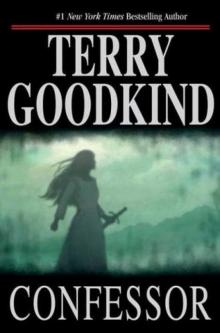 Confessor
Confessor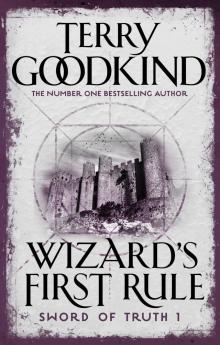 Wizard's First Rule
Wizard's First Rule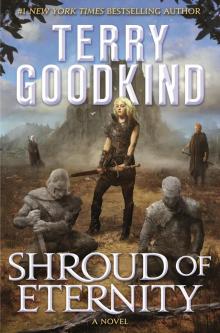 Shroud of Eternity
Shroud of Eternity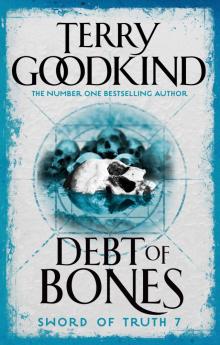 Debt of Bones
Debt of Bones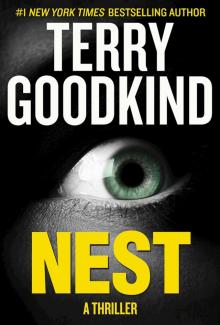 Nest
Nest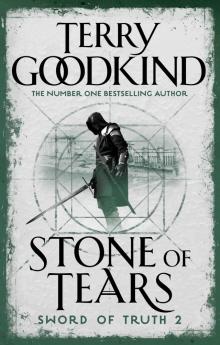 Stone of Tears
Stone of Tears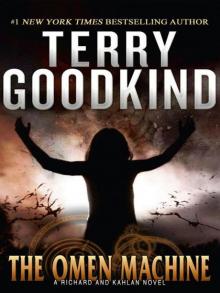 The Omen Machine
The Omen Machine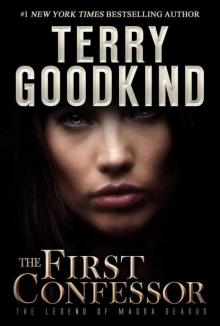 The First Confessor
The First Confessor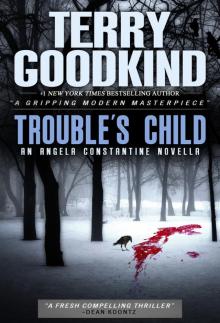 Trouble's Child
Trouble's Child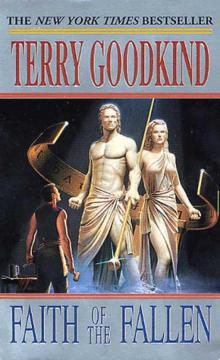 Faith of the Fallen
Faith of the Fallen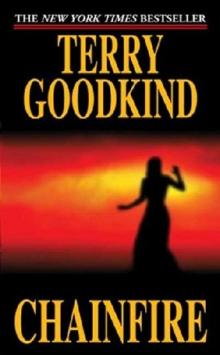 Chainfire
Chainfire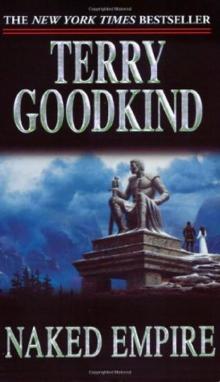 Naked Empire
Naked Empire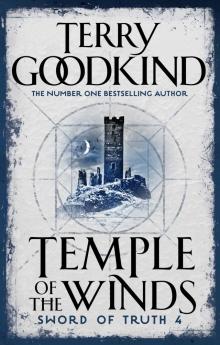 Temple of the Winds
Temple of the Winds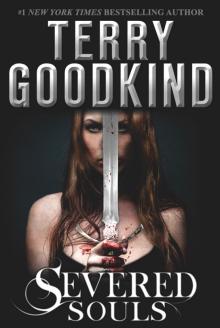 Severed Souls
Severed Souls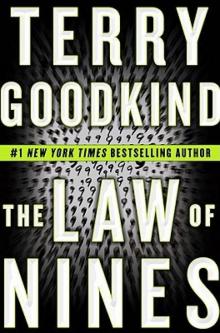 The Law of Nines
The Law of Nines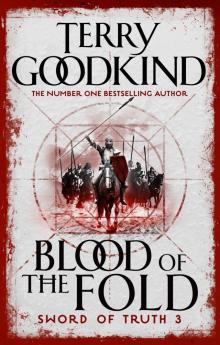 Blood of the Fold
Blood of the Fold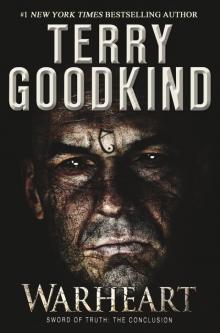 Warheart: Sword of Truth: The Conclusion
Warheart: Sword of Truth: The Conclusion The Sky People
The Sky People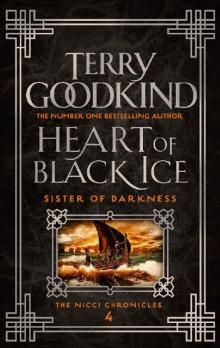 Heart of Black Ice (Sister of Darkness: The Nicci Chronicles Book 4)
Heart of Black Ice (Sister of Darkness: The Nicci Chronicles Book 4)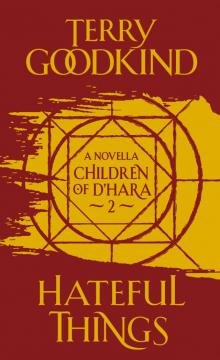 Hateful Things
Hateful Things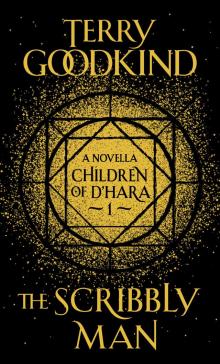 The Scribbly Man
The Scribbly Man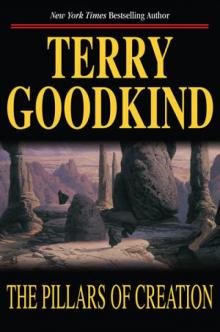 The Pillars of Creation
The Pillars of Creation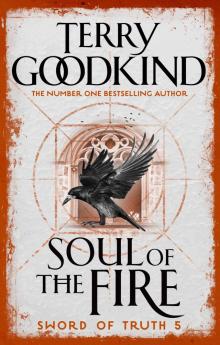 Soul of the Fire
Soul of the Fire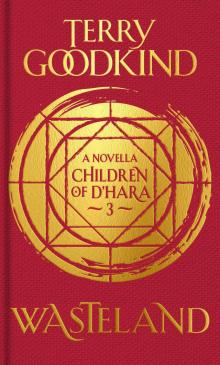 Wasteland
Wasteland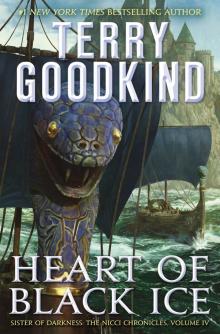 Heart of Black Ice
Heart of Black Ice Crazy Wanda
Crazy Wanda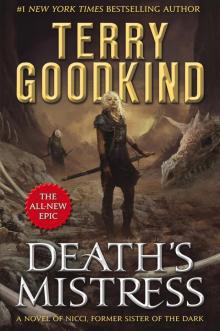 Death's Mistress
Death's Mistress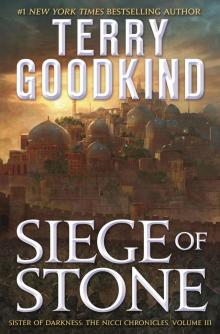 Siege of Stone
Siege of Stone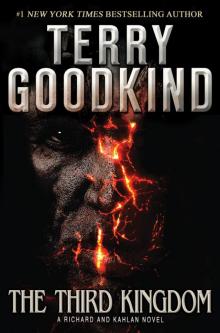 The Third Kingdom
The Third Kingdom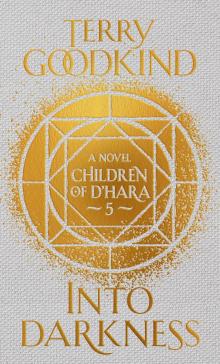 Into Darkness
Into Darkness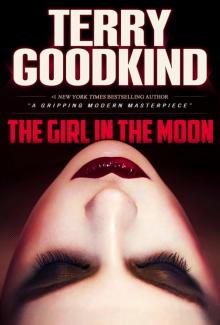 The Girl in the Moon
The Girl in the Moon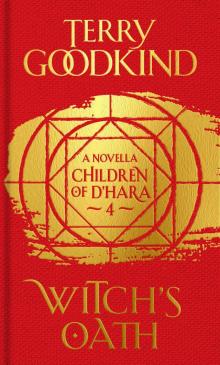 Witch's Oath
Witch's Oath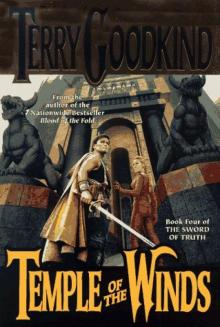 Temple of the Winds tsot-4
Temple of the Winds tsot-4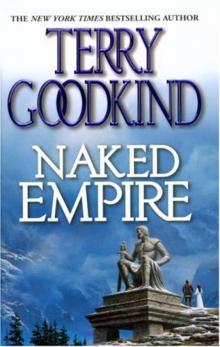 Naked Empire tsot-8
Naked Empire tsot-8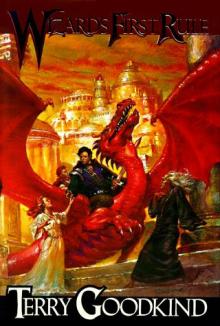 Wizard's First Rule tsot-1
Wizard's First Rule tsot-1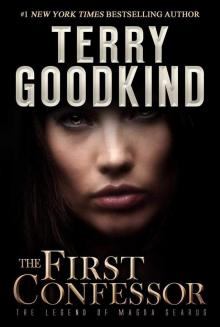 The First Confessor (The Legend of Magda Searus)
The First Confessor (The Legend of Magda Searus)![[Sword of Truth 9] - Chainfire Read online](http://i1.bookreadfree.com/i1/03/27/sword_of_truth_9_-_chainfire_preview.jpg) [Sword of Truth 9] - Chainfire
[Sword of Truth 9] - Chainfire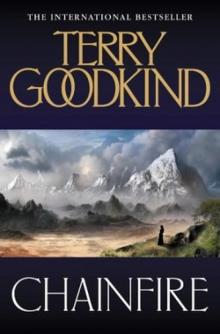 Chainfire: Chainfire Trilogy Part 1 tsot-9
Chainfire: Chainfire Trilogy Part 1 tsot-9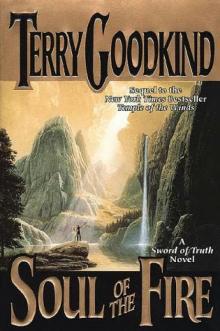 Soul of the Fire tsot-5
Soul of the Fire tsot-5 Pillars of Creation
Pillars of Creation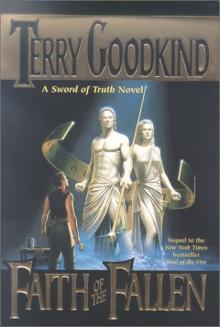 Faith of the Fallen tsot-6
Faith of the Fallen tsot-6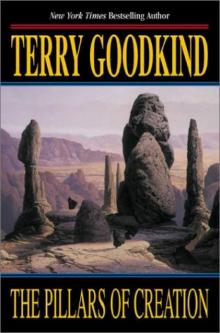 The Pillars of Creation tsot-7
The Pillars of Creation tsot-7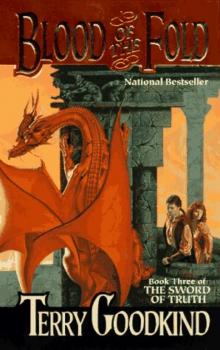 Blood of the Fold tsot-3
Blood of the Fold tsot-3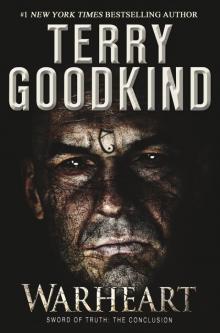 Warheart
Warheart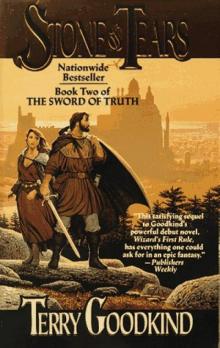 Stone of Tears tsot-2
Stone of Tears tsot-2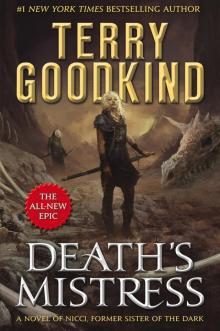 Death's Mistress--Sister of Darkness
Death's Mistress--Sister of Darkness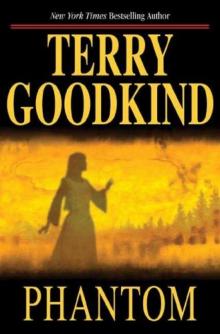 Phantom: Chainfire Trilogy Part 2 tsot-10
Phantom: Chainfire Trilogy Part 2 tsot-10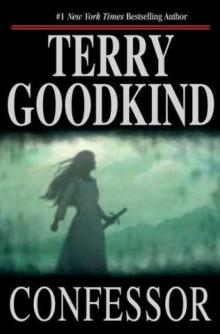 Confessor: Chainfire Trilogy Part 3 tsot-11
Confessor: Chainfire Trilogy Part 3 tsot-11